#this is not a critical analysis
Text
It occurs to me that I've now watched all the past Gundam shows I'm inclined to. So how about a totally arbitrary personal ranking? Here are brief opinions on each iteration of the franchise I've seen, mostly surface-level, bad to good, intended purely to get them out of my head and mark the 'achievement' of having binged quite so much giant robot nonsense. Every one of these shows will be someone else's favourite and I respect that. I too have things I like a lot that other people don't. That's how it goes.
(I stress this chiefly because there's a new Gundam airing right now and that probably makes this a really bad time to start weighing in with opinions on the internet. For the record, I am watching The Witch From Mercury too, but consider it way, way too early to say what I think of it.)
So, first up, let's exclude the ones I bounced off too hard to finish, which are Mobile Suit Victory Gundam (1993) and Mobile Suit Gundam SEED (2002). I quit each after a few episodes, so I don't feel like I can form a proper assessment beyond 'I didn't like it'. I will probably continue with Mobile Fighter G Gundam (1994) some day but that too is hovering at the 'I'm not sure this is worth it' mark – it's just not the kind of show I enjoy.
Also – honourable mention for Code Geass. Utterly batshit crazy, tonally all over the shop, and possibly the worst attempt at anti-imperialism I've ever seen in my life. If that's even what it was going for, which I am not sure it was. Frequently delightful anyway and the slashiest closing art you could imagine.
Now on to the Gundam shows I actually got through. Mild spoilers to follow so everything else will go under this cut.
Mobile Suit Gundam AGE (2011) – Actively fascistic. Not intentionally, I don't think, but while it's got a decent structural conceit, it's off with the birds in its grasp of how conflicts actually work and ends up relentlessly painting an abandoned underclass as the aggressors. I realise part of the point is flipping that around at the end. My point, though, is that it fails to land in the worst way possible. Plus all three of its protagonists are extremely irritating.
Mobile Suit Gundam F91 (1991) – I . . . can barely remember anything that happened except that watching this was like pulling teeth.
Mobile Suit Gundam 0083: Stardust Memory (1991) – Top Gun with mobile suits was an experiment worth doing but the cast is pure cardboard.
Mobile Suit Gundam: Char's Counterattack (1988) – I originally watched this without the full context of the preceding series and honestly, coming back afterwards doesn't really improve things. I'm not sure I have a strong opinion, except that a lot of it feels deeply mean-spirited.
Mobile Suit Gundam: Hathaway (2021) – I'm dropping this low primarily because I despise the battle animations. They make the mistake of assuming 'at night' means 'dialling the contrast down' and it undercuts the visuals entirely. Textbook example of poorly implemented CGI ruining an otherwise well-thought-through creative decision. Beyond that, it's mostly OK, I guess.
Mobile Suit Gundam (compilation movies; 1979) – Yes, I wimped out on watching the whole thing but in my defence, I don't like Amuro Ray very much. That said, there's a real charm to the animation that very few of the other series ever match. This show renders guys being dorks like nothing else. And I do absolutely see why it lasted. It's a rough first draft but there's a lot to get the teeth into, even if it is, ultimately, not my thing.
Mobile Suit Gundam 0080: War in the Pocket (1989) – Technically leaps and bounds ahead of its predecessors both in terms of animation and story construction. Absolutely unafraid to be soul-crushingly cynical, which works to its advantage. Also not my thing but I respect its ambition.
Mobile Suit Gundam Thunderbolt (2015) – Same, really. Plus a test case in how far empathy for people on the side of the space-Nazis can be pushed. Actually, it's worth pausing on that because the contrast being 'extremely psychopathic' Federation pilot Io and 'generally sweet-ish' Zeon pilot Daryl highlights the grey vs grey morality inherent to the Universal Century (UC) timeline. At its best, that leads to genuinely nuanced stories about what conflict does to both people and ideals when various factions use them to vie for power. At its worst, it leads to a total muddling of audience sympathy and political message. Thunderbolt is, I think, squarely in the middle.
Mobile Suit Gundam 00/Mobile Suit Gundam 00 the Movie: A Wakening of the Trailblazer (2007/2010) – This, for me, is what's called a Curate's Egg – parts of it are very good. Get yourself someone who looks at you the way Patrick Colasour looks at Kati Mannequin. Or if you're into it, the way Kati looks at Patrick. The super-soldier stuff is interesting in ways the Newtype idea generally isn't. And random cross-dressing is always welcome. However, I can't say I like it overall. Rooting early sections in 'resolving' real-world conflicts is tasteless and it's the epitome of Gundam not understanding pacifism as an ideological position. It also plays straight the idea of humanity making an evolutionary leap to godhood, which I don't enjoy for a wide variety of reasons.
Mobile Suit Zeta Gundam (1985) – Honestly, I'm mainly giving this such a high ranking because the English dub gives Char such an incredibly sexy voice. On balance, I'd say I enjoyed more of this than I did of 00, but it probably ought to go lower for being an example of that thing a lot of Gundam shows do which is having interesting female characters, then doing feck all with them or mashing them into teeth-gnashingly bad unrequited love subplots.
Mobile Suit Gundam: Unicorn (2010) – I am putting this ahead of 00 and Zeta because it's a technically superior piece of story-telling, with a much clearer idea of what it's doing. And it does indeed do some things very well; they're just not ones I gel with.
Mobile Suit Gundam ZZ (1986) – And now to stress that quality does not necessarily equate to enjoyment, here's the comedy one placing above Zeta and Unicorn. Well. 'Comedy'. It's not necessarily especially funny. But I find the characters and set-up to be generally more appealing than a lot of the UC shows, and some of the slapstick works pretty nicely. Plus, you know. Haman Karn. Who doesn't love a dastardly villainess? (I actually do think she's one of the more interesting UC antagonists, albeit mainly when she's in active contrast to the others.)
Mobile Suit Gundam Wing/Gundam Wing: Endless Waltz (1995/1997) – I am delighted by the story Gundam Wing's many fans have hallucinated into existence. I genuinely think it's a lovely example of how fandoms construct and expand on things only gestured to in the original text. Which is the nice way of saying coming back to this 15 years on from first watching it was a bit of a slog. There's something very theatrical about Wing, in that it does a lot with narration and flimsy set-dressing. It's insanely ambitious in what it's attempting and I have a lot of nostalgic affection for it. But in the end, I think it's less than the sum of its parts.
Mobile Suit Gundam: Twilight AXIS (2017) – Very lightweight and inessential. Nevertheless, an interesting exercise in telling a complex story with extremely limited space.
Mobile Suit Gundam: The Origin (2015) – OK, fine, I'll admit it. I might not rate a lot of the Universal Century stuff but watching Char connive his way to power is fun. And this assays the original animation style very well, even if the CGI mobile suits jar in the extreme. Overall, this is a case of general quality boosting where I'm prepared to rank it.
Mobile Suit Gundam Narrative (2018) – Proves you can go a long way with a decent soundtrack. Also, I think I prefer stories about people caught up in the wake of Newtypes than about the Newtype characters themselves. Benefits from knowing the wider UC backstory going in and not necessarily 'good', but definitely enjoyable.
Mobile Suit Gundam: The 08th MS Team (1996) – Dumb as rocks, driven solely by machismo and excitement, very dodgy in its handling of sexual politics, and the single most fun piece of UC media I have watched. A case of hitting a genre so squarely in the bullseye, forgiving its faults is easy. Gundam as an 80s action flick and it knows it. Has one of the few UC protagonists who fully commits to giving the Federation two middle fingers and peacing out of their bullshit, and ends in a surprisingly sweet and thoughtful manner.
Gundam Reconguista in G (2014) – I could not begin to describe to you the plot of Reconguista and I'm not sure anyone involved in writing it could either. However, I did find the main characters to be a delightful bunch of total numbskulls to hang around with for twenty-six episodes. Also one of the more successful aesthetic shifts in the Gundam franchise. I suspect this is the one that will have the greatest influence on the current iteration's look and feel.
After War Gundam X (1996) – I covered much of my thoughts on this already. A great final act twist and all the benefits of streamlining over continuity wrangling. Nicely focused on the idea that what humanity screws up, humanity can undo (in both senses of the word). I admit to ranking this highly partly to spite the reviews quoted on Wikipedia, which are straight up wrong; it does have a lot of flaws, just not the ones those reviews point to. But also I really enjoyed it. It does Wing's breakneck geopolitics better and UC-esque themes with greater clarity. I'd love to see this setting and cast developed more, so it's a shame it's joined Reconguista in G as the also-ran of the franchise.
Turn A Gundam (1999) – Where to even start? Beautiful to look at, audaciously clever in how it relates to the other Gundam series, a wonderful, engaging cast of characters, and the splendour that is Harry Ord's fashion sense. Manages the rare trick of having an intelligent, genuinely meaningful identity switch plot, as well as showing that Gundam can treat pacifism with respect and real engagement if it tries. Brought down in places by lazily racist genre tropes and gets a touch rushed towards the end, but overall a very solid show. All this and the main mobile suit is referred to by its moustache throughout. What more could you want?
Mobile Suit Gundam: Iron-Blooded Orphans (2015) – This. I mean, this is what more I could want. After making the experiment over the last year and change, I'm quite happy to declare that I am not a Gundam fan, I'm an Iron-Blooded Orphans fan. For me, this one stands head and shoulders over the rest in terms of plot, characters, aesthetics and general vibe. While I've enjoyed going back and seeing first hand where the self-references come from, I think this is the only Gundam show that is ever going to occupy so much real-estate in my mind as to fixate me on writing fan-fic for a solid year and a half. I won't bore you by repeating stuff I've said in my other posts on the subject. However, I would quite honestly recommend this as A Good Show to anyone interested in the mecha anime genre, with the upfront warning that it is plotted as a tragedy and should be approached as such.
And there you have it. Again, this is all personal feelings and not intended as any slight on anyone with a different opinion (I will probably look at you askance if you say AGE is your favourite, but only because I had such a visceral negative reaction to it, it's going to take me a while to be open to reassessing). Now if you'll excuse me, I have to get back to being pathetically ill in the most annoying way possible.
#Gundam#so much Gundam#opinion#more rambling#sorry I'm not tagging every single one of these shows#mobile suit gundam#turn a gundam#Gundam Iron-blooded Orphans#After War Gundam X#gundam 00#this is not a critical analysis#gods help me I'd be here all day if it were#my impressions
10 notes
·
View notes
Text


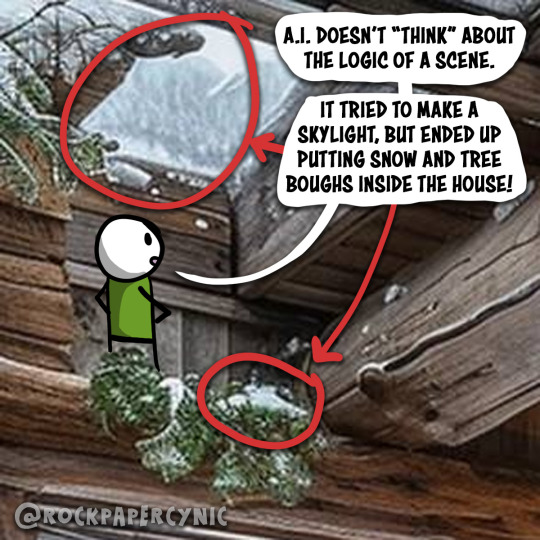
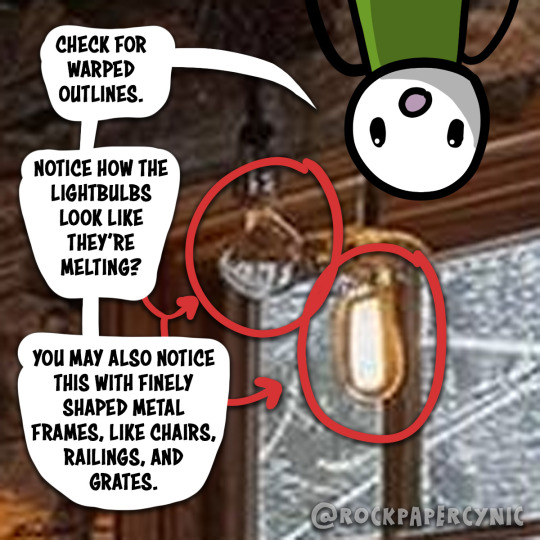
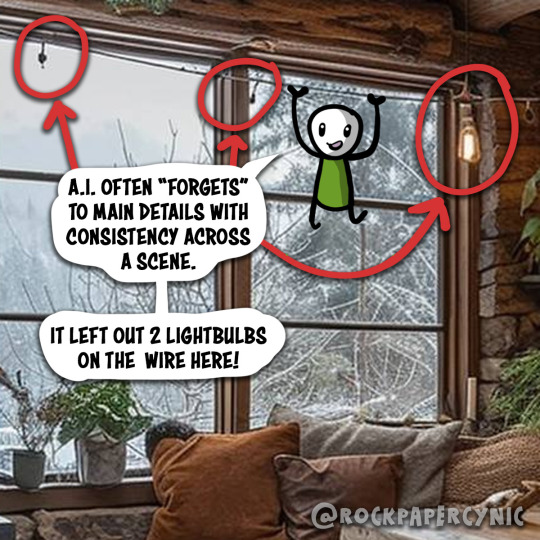
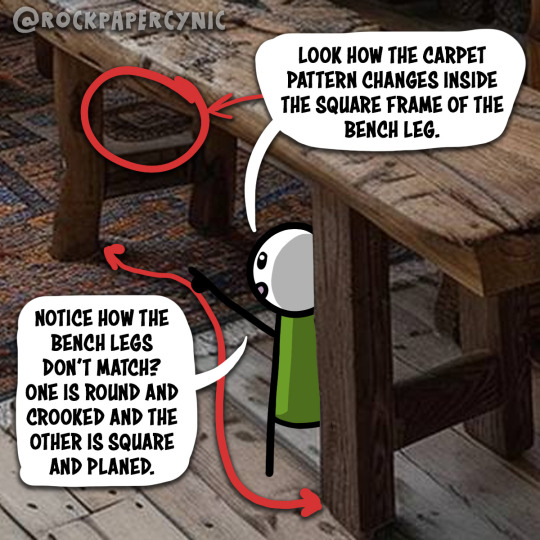

A.I. photos are flooding social media and contributing to an Internet where we can't believe what we see. Spotting A.I. 📷s is an important media literacy skill.
None of us have time to research every image we see. We just need people to notice BEFORE THEY LIKE OR SHARE that an image might be fake. If unsure, check it or don't share.
I've started drawing some comics explaining the basic of AI spot-checking and media literacy in the age of disinformation. Follow along here or on my Twitter.
30K notes
·
View notes
Text
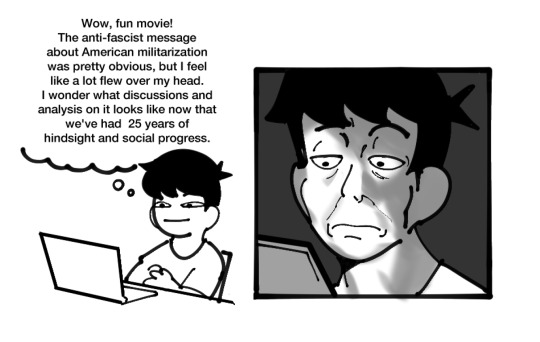
I watched Starship Troopers tonight.
#personal#dumb#my art#immediately after finishing i was pumped to watch some analysis vids on it#cuz i heard a lot of the drama about the original author being a pro military fascist and the director going “fuck that” and making a satir#scrolling through youtube search results was not promising. lots of male film buffs i would Not trust even on a first glance.#“The Critical Drinker” (pfp of a bearded man drinking alcohol) lol.#and then I saw cinemawins did a video on it and was like oh nice i haven't seen his stuff in a while but he's a pretty leftist creator#scrolled through the comments#second panel face#this sucks i'm outta here.#just leagues and leagues and leagues of anime pfps and right leaning people dogpiling on him for “not understanding what fascism is”#idk it's pretty alien and weird to me watching this movie and going “wow yeah that was pretty obvious huh” like literally the from opening#to the teacher preaching militance and only giving voting rights to “those who serve their nation first and earn it”#and then seeing droves of people online going#WHAT ARE YOU TALKING ABOUT? It's not anti-fascist and even if it was it's#the director's fault for desecrating heinlein's incredible sci-fi epic vision. ermm media literacy is dead.
5K notes
·
View notes
Text
What About The Kens?
I'm already seeing guys complain about the Barbie movie end, how they wanted Kens to be equal in Barbieland but were only given a small part on the Cabinet.
That's the point.
You're meant to feel bad for the Kens. Believe me, women aren't partying over the 'Returns to Matriarch' ending. Some will be, but the ones who also clocked the meaning behind it won't. Most women will also feel bad for Kens. Because it's an exact parallel to how women are treated in reality.
Men, you're meant to be upset. You're meant to question it. Because you're meant to feel it, and feel what that is like, so you can finally understand women. You're upset at seeing it in a movie, now imagine living it in reality. That's being a woman.
Kens were shit on so you could feel what it was like for women this entire time. Kens were being used as a placement so you could see yourself in a woman's shoes. A world dominated by the opposite sex. When Ken leaves, and sees male presidents (All men) for the first time, men being doctors and lawyers, etc, realising he is more than just a prop for Barbie, that was on purpose. Because that is the feeling that Barbie gave to women. It's why you cheer for him at first before he goes a little overboard.
It's exactly why the real world was an exaggerated Partriarchy and Barbieland an exaggerated Matriarchy. Neither wins. Neither is equal. None of them change for the better. It's why you should want women in the real world to be respected, and Kens in Barbieland to be respected.
The thing is, women also didn't win. Not in the real world. In Barbieland, yes, but not anywhere else. The real world didn't change. But you didn't notice, did you? That Gloria (The mother that helped Barbie) also didn't get a position on the Mattel board? It was still all men? Her idea was ignored until it made a profit, and the men will likely get the credit? She'll still just be the receptionist? The women representing the real world didn't get anymore opportunities, neither did the men in Barbieland.
I was hoping that Gloria would be offered a position on the board, and that the Barbie Cabinet would introduce another entire Cabinet to represent the Kens, but neither happened. They're complete mirrors.
But which one did you actually notice? Which did you actually care about? Now tell me again the ending was unfair. Because it was. For both parties. That's the point.
The difference is, Barbieland is fictional. You will walk out of the theatre with the reassurance that at least it's not real. Women won't. Women can't. Companies not giving women equal opportunities or voices isn't fictional, and that was just one example. There are no women presidents (USA at least) for us to go look at in the real world. We don't have somewhere to go to realise it could be different for us like Ken did. Barbie and make believe is all we had when we were kids, or even now.
You're supposed to be mad, just not at the movie.
#It's going right over people's heads#I've seen men complaining about the inequality. That's the point. Now you know how it feels. Apply that same frustration#And turn it into empathy for women in reality. Because it's not nice is it?#Please for the love of God people need lessons in analysis and critical thinking#It's not a 'women just hate men and this is a women only movie'#It's please realise that you've seen what it's like to be in women's shoes. Now be the change for women that you wanted for Kens.#Barbie#Barbie Spoilers
8K notes
·
View notes
Text
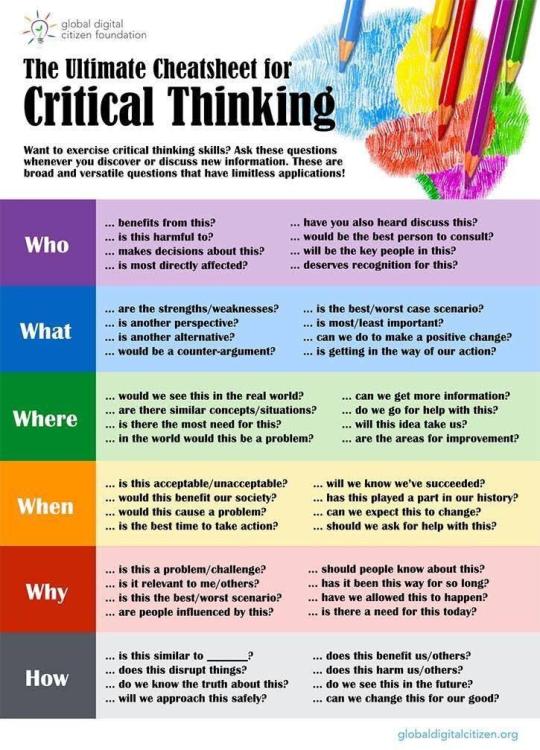
Critical Thinking Cheatsheet
#critical thinking#analysis#problem solving#thinking#life hacks#life tips#life lessons#motivation#mindset#psychology#educational
13K notes
·
View notes
Text
You know, it's rather interesting to me that Taylor Swift's parasocial relationship with her fans is honestly more akin to a YouTuber than a writer's. When I scroll through her tag on tumblr/Twitter, it's far more regarding the connection to her personal life/relationship developments than the actual metaphors/fictional story she might be telling. Everything comes back to how her songs reflect back on her relationships with Joe/Matty/Travis/Jake/insert ex-boyfriend here. And what fascinates me about it is that even though she complains about it, she leans into that very perception because it strengthens the parasocial bond.
The marketing for TTPD so clearly being about Joe Alwyn and the songs to Matty Healy. The marketing/video for Red TV so CLEARLY being about Jake Gyllenhaal, with so many of the new lines in All Too Well specifically being digs at him (I'll get older but your lovers stay my age, casting an actor that looks like him for the video, specific lines in I Bet You Think About Me). The fact that songs like Getaway Car and Bejeweled and Gorgeous and London Boy and Lavender Haze being picked apart at time of release and long after for signs of relationships crumbling. The way she uses surprise songs in relation to her relationship development with Joe/Matty/Travis. The damn TTPD "stages of grief" playlists where she deliberately undid/changed the meanings of old songs just to keep her audience speculating on her love life.
It's not sexist to point out that her wielding her love life is a marketing tool and that the strongest connection to her audience isn't the strength of her writing/the composition of her music- it's her deliberate crafting of a connection between her music and her personal life, leaving the audience invested in her music as an extension of Taylor the Person/Girlfriend rather than Taylor the Artist.
#taylor swift#anti taylor swift#to an extent#i honestly just view this as an analysis of her marketing strategy#like hates off to her for being the best possible microcosm of parasocial capitalism#girlie really knew how to harness the teen girl market and good for her billionaire self#she knows how to exploit the very tabloid culture that once strangled her#how to become the tabloid itself#and wield that against ex-boyfriends too but you didn’t hear that from me#joe alwyn#matty healy#travis kelce#taylor swift critical#ttpd#red tv#i bet you think about me#getaway car#bejeweled#gorgeous#london boy#lavender haze
2K notes
·
View notes
Text
I mean, yes, a lot of horror media boils down to “wouldn’t it be fucked up?”, but let’s not be reductive – there are several distinct subgenres of “wouldn’t it be fucked up?”, including but not limited to:
Proposing a very improbable situation, then gesturing toward it and asking “man, wouldn’t this be fucked up?”
Wildly exaggerating an everyday state of affairs in order to demonstrate that it was, in fact, always fucked up.
Taking a thing that it’s broadly agreed is fucked up and making it a different kind of fucked up.
Inventing a new type of guy, then pointing at the guy and going “this guy is fucked up.”
Grabbing the audience by the shoulders like, no, man, the fucked up thing is, like, a metaphor. For a different thing. That is also fucked up.
Taking a genuinely innocuous situation and through some unlikely contrivance rendering it fucked up.
Making a thing that self-referentially gestures at itself and asks “isn’t it fucked up that this is so fucked up?”
Framing a fantastical scenario and asking “is this fucked up? why is it fucked up? what does it mean to be fucked up? what is ‘fucked’? what is ‘up’?”
12K notes
·
View notes
Text
a lot of people have already pointed out how totk has a lot of themes of imperialism and generally leans conservative ideologically, but what i think is interesting is how totk subtly redefines what a “researcher” is.
zelda wants to be a researcher in botw, and what this means in the context of botw is largely someone who works with sheikah technology. she wants to figure out ancient sheikah tech, she has an interest in botany and otherwise nature and biology (the whole silent princess and the frog thing), robbie and purah, the two characters who are the closest to us seeing what a researcher in the context of botw is are basically inventors. in totk, however, the main researchers who are presented to us are all historians.
this is an interesting pivot, because in botw zelda is not really interested in history. if anything, the one who’s deeply concerned with history is rhoam, wanting to preserve historical tradition and his uncritical reliance on said tradition and historical precedent is what leads them to their doom. in botw, zelda is narratively opposed to history, if anything, all the ancient tech backfires on them and traditions fail to awaken zelda’s power. zelda’s urge to be a researcher is in wanting to understand the world around her, not just blindly follow ancient plans but rather have agency within them.
totk, however, is obsessed with ancient plans. the only real moment where zelda gets to geek out in totk is her getting all giddy about finding out more about the divine origins of hyrule. all the researchers in the game are concerned with finding out more about the zonai. since all the mentions of ancient sheikah technology are scrubbed from the game purah and robbie read more as strange outliers, the sheikah slate is no longer, now it’s the purah pad, a product of purah rather than something larger. the whole game is literally about following an ancient plan, a plan most characters don’t fully understand as they sign up for it. totk’s main story is built on confusion, on the characters not knowing what’s fully going on but having faith in ancient sages telling them what to do. in botw, following ancient plans you don’t fully understand was the thing that doomed you. in totk, following ancient plans you don’t fully understand is the gimmick.
that juxtaposition between the two games has an ideological through line: botw posits that progress is necessary. mindlessly relying on tradition doesn’t work. prophecies are omens, not instructions. history must be learnt from, not repeated. the ancient sheikah aren’t a group to be emulated, but rather to be learnt from, considering their machinery backfired and the royal family betrayed them. totk, however, is obsessed with the mythical history of hyrule, a time where everything was idyllic until one bad man showed up, a time we must emulate in order to win. i already talked about how the past in totk is zelda’s life pre calamity but better here, but that also plays into the idolisation of that era and its royalty. in botw, even the myth of the first calamity preserves the fact that the yiga clan has origins in the royal’s family persecution of the sheikah, even the time when they successfully held back the calamity is tinged with mistakes that still affect the world ten thousand years later. in totk, ganondorf’s origins are nebulous. nobody provoked him, nobody did anything wrong, he’s just evil because he is.
a lot of right wing ideologies are hinged on preservation, but more than that: the belief in the nebulous mythical past in which everything was better. “make america great again”, the fascist’s idolisation of ancient rome which is represented largely inaccurately, look at any conservative rhetoric and you’ll see people complaining about how things nowadays are ruined or are being ruined, how in the past things were this way and they’re not anymore, which is bad. the belief in the fact that in some past period we were great and are not anymore, and the strive to emulate that past is a trait highly typical of right wing ideologies. and in totk the past as a great era is an idea presented completely uncritically, the narrative is entirely controlled by the game and doesn’t dwell on any of the inconsistencies in this idea.
now, obviously, not every story in which a great ancient era exists is fascist, right wing or conservative. but to me what’s interesting specifically in totk is this shift between the two games: botw is critical of the past. it’s critical of arrogantly repeating history, it’s critical of having blind faith in great relics of the past. totk isn’t. totk idolizes the past, totk tells legends and tells you to believe them without any doubts. botw believes researchers are those who seek to understand the world, innovate it and solve problems without relying on ancient ways. totk believes researchers are those who discover ancient instructions, ancient ways and relay them to great men in the present to be followed. the four mainline regional quests in botw are about discovering four ancient relics that are terrorising the land and fixing the mistakes of the past. the four mainline regional quests in totk are about discovering four ancient legends are true, and receiving instructions from an ancient sage on what to do.
totk is not simply neutral, it is ideologically conservative in stark contrast to botw, because of the things it chooses to leave uncriticised, notably the things botw was very poignant about examining critically. the way totk redefines what is a researcher is indicative of this, indicative of the way it chooses to idolize or present as an unexamined good that which was nuanced in botw. totk isn’t just conservative in the sense that it presents uncritically a “good king” and “evil conquerer”, it goes deeper, it’s notable because botw was starkly opposed to the thematic axioms totk presents.
i just think it’s very interesting that they made a sequel to botw, and completely redefined or otherwise ignored botw’s thematic core.
#totk critical#loz#botw#totk#legend of zelda#tears of the kingdom#breath of the wild#meta#analysis#my hot takes
2K notes
·
View notes
Text
It's been a while since I watched Supernatural, so don't take my opinions as gospel or anything. But I think Dean is self-hating to the point of narcissism in some ways. Don't get me wrong, I empathise with Dean and understand why fans largely do too. But his self-loathing warps his perception and becomes the centre of EVERYTHING and at times that really has ripple effects on those around him - particularly Sam.
Take their childhood, Sam has a right to mourn the fact that he didn't get a normal childhood. He's allowed to be angry that he didn't get a home, a present father, a stable community, and consistent education. But whenever Sam attempts to express his complicated feelings about his childhood, Dean immediately interprets it as ' oh I was supposed to look out for you. Are you saying I failed? Are you confirming I'm worthless?' which grinds the conversation to a complete halt. Because of Dean's intense self-criticism, Sam can never really be 100% honest with him or ask for support with his own issues, especially regarding their childhood. As anything outside of 100% gratitude just becomes another stick for Dean to beat himself with, and the conversation is immediately derailed.
Not only does Deans self-hatred mean that Sam's expression of his own experiences are pretty consistently shut down. In some ways, I think Dean strips Sam of his autonomy - he's so self-loathing, he sees every decision Sam makes as being about/a reaction to him. A good example of this is Stanford. Rather than understanding Stanford for what it was, an attempt by Sam to carve out a better life from himself and escape hunting. Dean views it as betrayal or abandonment, some re-affirmation of his own belief that he's not worth caring about. Rather than understanding it's a rejection of hunting, he sees it as Sam rejecting him. To Dean, Sam isn't attempting to find a better life, he's punishing the family.
Overall, it's interesting that people largely and rightfully sympathise with Dean due to his self-hatred. However, I don't see as much discussion about how his self-hatred doesn't just hurt him, it hurts those he's close to, as it colours his interpretation of their every action. Dean's self-loathing is always the biggest thing in the room and that has consequences.
633 notes
·
View notes
Text
honestly, book 1 gaang was so perfect because it was like. neurotic control freak micromanaging airport dad, chill wine aunt who is down to clown (eg, stage a revolution, shoplift, square off against respected tribal elders in the city hall parking lot, etc etc), and a freshly newborn puppy who always has the zoomies. who could ask for a better trio
#sokka#katara#aang#<- in that order. in case that wasn’t obvious#pushing my ‘katara is the cool aunt friend’ agenda all of a sudden#also yes i am being purposely reductive for the sake of Jokes & Humor#as is my right.#i’ve clocked enough hours at the serious critical analysis factory i can make jokes if i want to!!!!!!! 😤😤#anyway.#i love them all so much….
428 notes
·
View notes
Text
Chloe's sudden shift in character because Thomas realized they were making her a little too redeemable is SO funny to me. Like:
Season 1: Chloe is a regular, one-dimensional high school bully.
Season 2: Chloe is actually a bit more of a complex person than that, because nobody is pure evil. But she's still definitely an asshole.
Season 3: Chloe is a child who was neglected by her mother and spoiled by her father, making her into the brat she is today. Marinette as Ladybug shows Chloe a bit of kindness that she might not have fully deserved, and Chloe takes those words to heart, working to be a bit better over time. Progress is slow, but not impossible.
Season 4: Chloe is a cartoonishly evil villain who never gave even half a shit about anybody.
Season 5: Chloe just about ruined Marinette's entire life years before the show even started, and is the reason that Marinette stalks Adrien (See? It wasn't creepy after all. Stalking is justified sometimes!). Just trust me, this was definitely the plan from the very beginning.
#seriously tho they did her SO dirty#miraculous ladybug#ml#miraculous#chloe bourgeois#marinette dupain cheng#ladybug#audrey bourgeois#andre bourgeois#adrien agreste#ml spoilers#miraculous spoilers#ml critical#ml analysis#ml salt
419 notes
·
View notes
Text
Zuko Doesn't Like 𝖬𝖺𝗂's Apathy
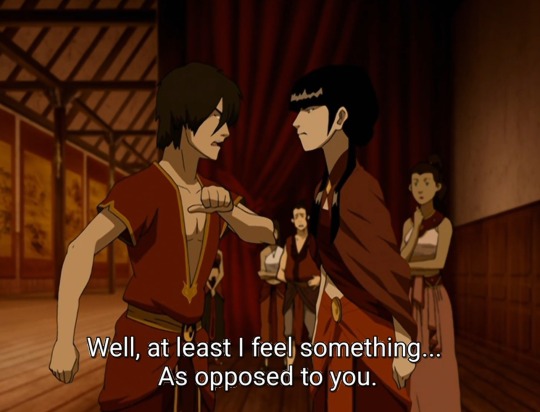

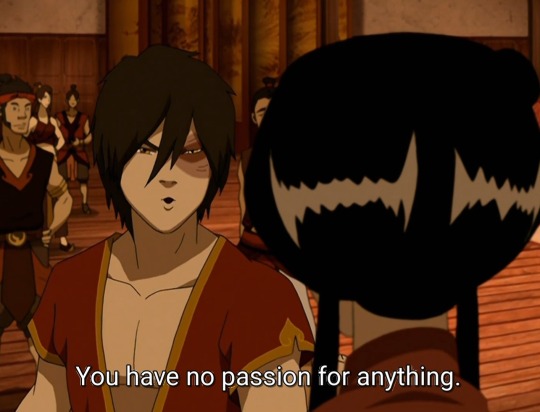
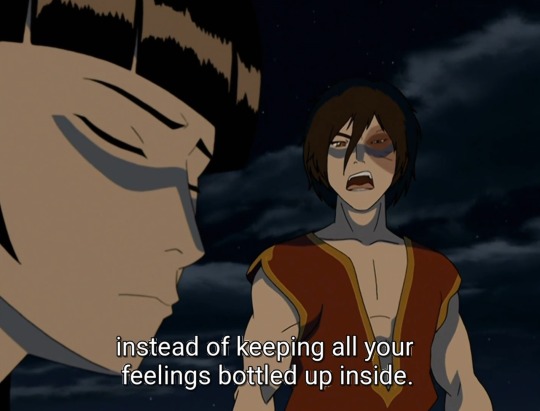
But I already hear you say, "These lines are from fights. He's angry and says things he normally wouldn't". I would argue that even though he's angry, his anger has to stem from some truth, but okay.
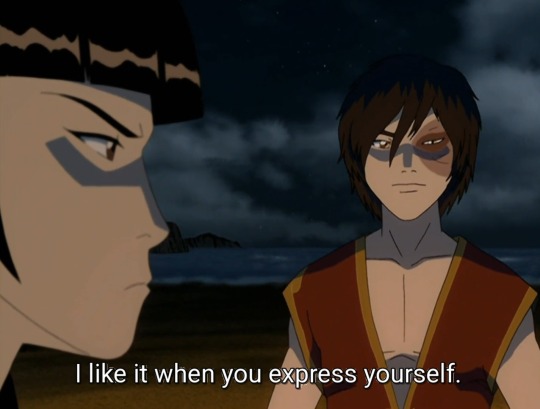
Here he's trying to appeal to 𝖬𝖺𝗂, appreciaying her, and is doing so through the one time she isn't her normal, apathetic self. Clearly he likes her, but he wishes she was someone else.
But you know who does have passion? Who does express herself?

#zutara#anti anti zutara#pro zutara#zutara analysis#zutara evidence#zutara forever#zutara meta#zutara nation#zutara should have been canon#zutara supremacy#zutara was robbed#zutarian#zuko x katara#katara x zuko#anti maiko#anti bryke#atla critical#atla critisism
534 notes
·
View notes
Text
Katara and Mutuality in Relationships
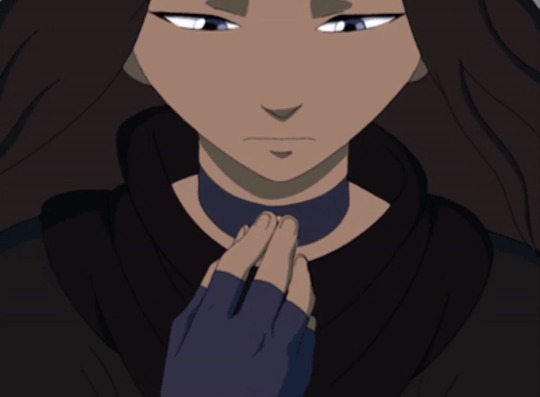
There are lots of conflicting opinions about which characters Katara felt attraction towards, which characters she didn’t, and how long she felt that attraction. I see in most cases, people point to quick clips of her faintly blushing or kissing another character on the cheek as evidence, but I think these kind of takes miss the nuance of the purpose attraction serves in a story.
Most importantly, I see these characters treated as if they are actually people capable of making their own decisions. It’s important to remember that these are fictional characters. They don’t make their own choices; the writers make their choices for them for the purpose of telling a story. From that standpoint, it’s more valuable to examine how a character’s story and narrative themes tie into their relationships with other characters. Animators can shove in a kiss or a blush wherever they want, but it’s harder to demonstrate through storytelling how and why two characters might feel attraction towards one another, and how a relationship between them would develop both characters and contribute to the overarching themes of the story.
In other words, when discussing which characters Katara is “attracted” to, I’m discussing which relationships and actions within the narrative build on her established story and arc. Romance is always integrated into a story for a reason, and considering that reason is important.
Unfortunately, ATLA is very much a product of its time in this way. It’s easy to see what romance adds to the arcs of the male characters—but not so much with the female characters. All three canon relationships (kataang, sukka, and maiko) follow this trend to some degree. The primary purpose of the woman in this narrative is to act as a prize for the man for performing some good deed. Once they’re together, she ceases having her own motivations and becomes an extension of the male character she’s dating. This is pretty blatant with Suki—she barely had a personality in that later seasons; she is there to be Sokka’s girlfriend. Similarly, Katara becomes a completely different character—she’s even animated differently—when the narrative pushes her into romantic scenes with Aang. Her character is flattened.
So what is Katara’s arc, and how do the romantic interactions she has throughout the series contribute to this?
Well, that could be a whole other essay itself, but to put it simply, Katara’s arc is one of a young girl devastated by grief at a young age clinging to hope that she has the power to fight and change the world for the better. Which she does as she gains power and confidence throughout the series—culminating in her defeating Azula in the finale.
But the part I want to focus on here is how Katara connects with other characters. She connects with them over shared experiences of grief and loss.
Take Haru, for instance.
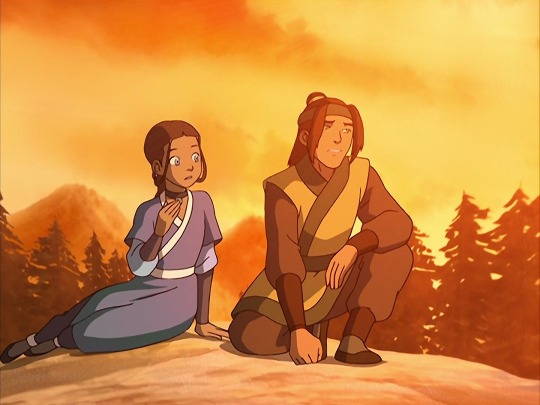
Haru: After the attack, they rounded up my father and every other earthbender, and took them away. We haven't seen them since.
Katara: So that's why you hide your earthbending.
Haru: Yeah. Problem is…the only way I can feel close to my father now is when I practice my bending. He taught me everything I know.
Katara: See this necklace? My mother gave it to me.
Haru: It’s beautiful.
Katara: I lost my mother in a Fire Nation raid. This necklace is all I have left of her.
Haru: It’s not enough, is it?
Katara: No.
This isn’t just a throwaway moment; it’s an important character moment that leads up to growth and the progression of Katara’s overall story, both in this individual episode and in the whole series.
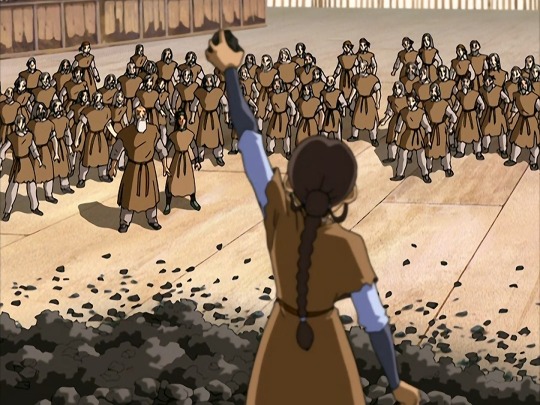
Katara finds her power in the connections she’s able to make with other characters. It’s a powerful driving force for her that makes her a strong character even before her bending abilities develop. Imprisoned was such an important episode to establish who Katara is and what her power is, and adds so much to her arc.
But there is one line in particular from the above exchange that also stands out: Haru says “it’s not enough, is it?” and Katara agrees. Even this early in the series, we’re establishing the fact that despite her drive and hopeful outlook, Katara feels deeply hurt, she feels a deep sense of loss that she opens up about to other characters in moments like these. But unlike Haru…Katara can’t go rescue her mother. Her mother is dead, and we see her grapple with that grief throughout the series.
Another character she reaches out to like this is Jet.
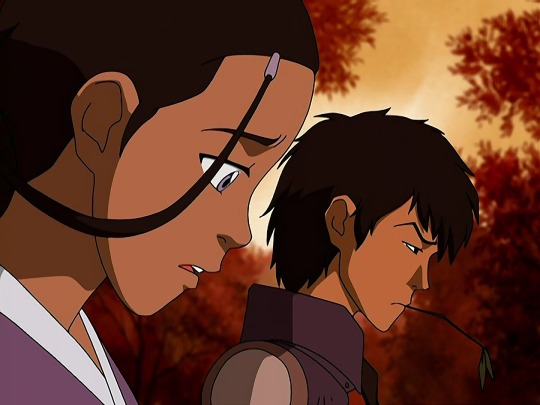
Jet: Longshot over there? His town got burned down by the Fire Nation. And we found The Duke trying to steal our food. I don't think he ever really had a home.
Katara: What about you?
Jet: The Fire Nation killed my parents. I was only eight years old. That day changed me forever.
Katara: Sokka and I lost our mother to the Fire Nation.
Jet: I’m so sorry, Katara.
Another important note about Jet is that there are explicit romantic feelings from Katara in this episode. Again, Katara empathizes with another character through a shared sense of loss. Sadly, in this case, Jet manipulated her feelings and tricked her into helping in his plot to flood the village…but those feelings were undeniably there.
That was the tragedy in this episode, but it also gives the audience so much information about Katara as a character: what motivates her, and what she wants. Katara is established as a character who wants someone who will connect with her and empathize with her over her loss—her greatest sense of trauma. She wants to help others but also receive support in return. The reason why she was smitten with Jet, beyond just initial attraction, is because he gave her a sense of that before Katara realized his true motivations.
A lot of people make the claim that Aang is good for Katara because he also feels a sense of great loss and trauma. And while on paper that’s true…does he really demonstrate that? I just gave two examples of characters Katara connected with this way, and both responded with deep empathy to what she said. Very early on in the show—the third episode—Katara attempts to connect with Aang the same way. How does he respond?
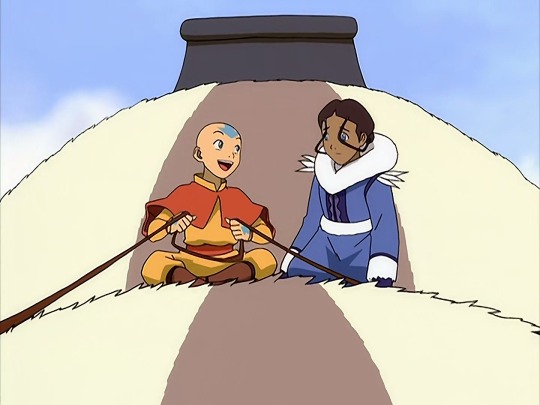
Katara: Aang, before we get to the temple, I want to talk to you about the airbenders.
Aang: What about 'em?
Katara: Well, I just want you to be prepared for what you might see. The Fire Nation is ruthless. They killed my mother, and they could have done the same to your people.
Aang: Just because no one has seen an airbender, doesn't mean the Fire Nation killed them all. They probably escaped!
Just compare this exchange to Haru and Jet. No effort to empathize, not even a “sorry for your loss” or anything. It’s a stark contrast, and the reason for that is because this narrative entirely centers Aang. Katara’s narrative always seems to be secondary to his when they’re together—which is exactly my point when I say this relationship has a fundamental lack of mutuality. It’s built that way from the beginning of the series. It does not add to Katara’s arc nor establish what about this dynamic would attract her.
And, look, before someone jumps down my throat about this…I’m not saying Aang is a horrible person for this response. I think it’s a sign that he’s immature and has a fundamentally different approach to problems than Katara. Katara is a character who has been forced to take on responsibilities beyond her years due to being a child of a war-torn world. Aang’s approach to problems is avoidance while Katara never had that luxury. It doesn’t mesh well.
This is all in Book 1. I honestly could have gotten on board with Kataang if the series meaningfully addressed these issues…but it didn’t. In fact, they actually got worse in some ways.
Back to Katara’s mother. We’ve established that this is a core part of Katara’s character and like in the scene with Haru, she indicates that this is an unresolved issue that pains her. But then, in Book 3, Katara actually does get a chance to confront this pain.
This would have been a powerful moment. Surely the character who is meant to be her partner, her equal, would have been there for her. Surely he would have understood and supported her, fulfilling her narrative and adding to her story.
But Aang didn’t do that. I won’t go into details because there are a million analyses out there on The Southern Raiders, but Aang’s response to Katara was the opposite of understanding. He got angry with her, insinuated that she was a monster for wanting revenge, and tried to dictate her behavior according to his own moral values. And importantly, from a narrative standpoint, he did not go with Katara. One of the most important events in her arc, and Aang didn’t support her—he actually tried stopping her. He didn’t contribute to her growth and development.
Also noteworthy:
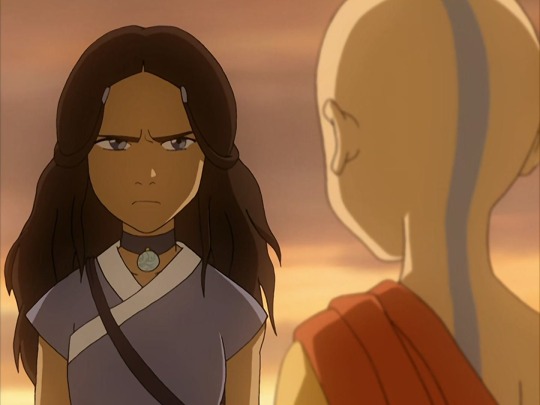
Katara: But I didn’t forgive him. I’ll never forgive him.
Even at the end of the episode, Aang clearly doesn’t understand at all what Katara is feeling. This line demonstrates it perfectly. He thinks she forgave him when that wasn’t the case at all…but of course, he didn’t even accompany her, so he didn’t see what actually took place. His worldview is fundamentally different from hers, and he’s consistently too rigid in his morality and immature to center Katara’s feelings.
Throughout Katara’s whole arc, her most significant character moments, Aang’s character just doesn’t come through the way Katara’s constantly does for him. Their narrative lacks mutuality. When Katara and Aang are together, she becomes an accessory to him. The ending scene is a perfect demonstration of this.
Now, to address the elephant in the room.
Which character does actually add to Katara’s narrative and support her growth as a character?
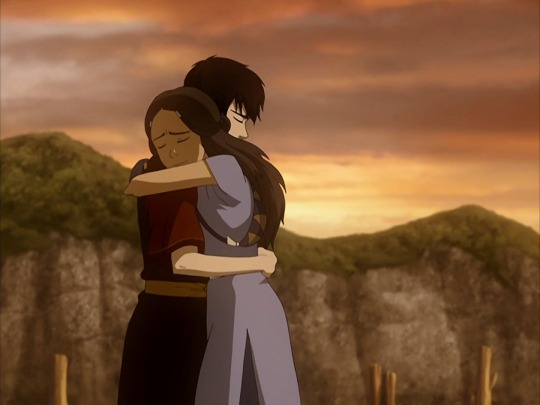
Correct! I just talked about how important The Southern Raiders is to Katara’s character and story, how it’s a chance for her to finally address the grief she’s been carrying since Book 1. And who stood by her side throughout this pivotal moment? Right—Zuko did.
You can talk all you want about how he’s a “colonizer” while Aang’s people suffered genocide, but you’re forgetting that “show, don’t tell” is one of the most basic aspects of storytelling. The fact is, despite how it looks on paper, Zuko was the one there for Katara at her critical moments. Zuko empathized with Katara more than Aang ever did—as demonstrated in this episode. Zuko never once brought up his own cultural values. Zuko never once told Katara what to do. Zuko’s position was that Katara should be the one to decide, and that he would support any choice she made. He supported her decision to spare Yon Rha, but he would have also supported her if she decided to kill him. I actually found this episode to be a satisfying reversal to what is typically seen in TV—for once, the female character is centered while her male counterpart takes the backseat and becomes a supporting role to her narrative.
Even before this, Zuko is shown to empathize with Katara.
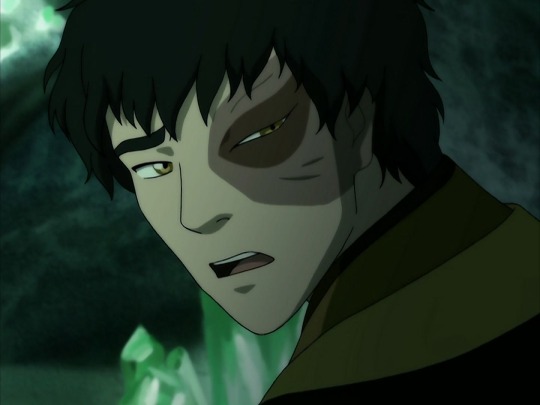
Zuko: I’m sorry. That’s something we have in common.
I think what gets me about this scene is the fact that he’s still Katara’s enemy, and she was just yelling about how she hates him and his people. But despite that, Zuko still empathizes with Katara. She is fundamentally human to him, and he expresses that to her in a way that allows them to connect. Zuko stands to gain nothing from this. It’s true that Azula entered the picture and twisted things around—but in this moment, Zuko’s compassion is genuine. His instinct was to respond to her grief with empathy, just like she consistently does for other characters.
And finally, how else does Zuko add to Katara’s arc?
I don’t think there is any more perfect of an example than the finale itself—the culmination of the arcs and development of all characters.
Zuko and Katara fight together. In a heartbeat, Zuko asks Katara to fight by his side against Azula, because he trusts her strength. She’s his equal—both in his mind, and in a narrative sense.
Then, this:
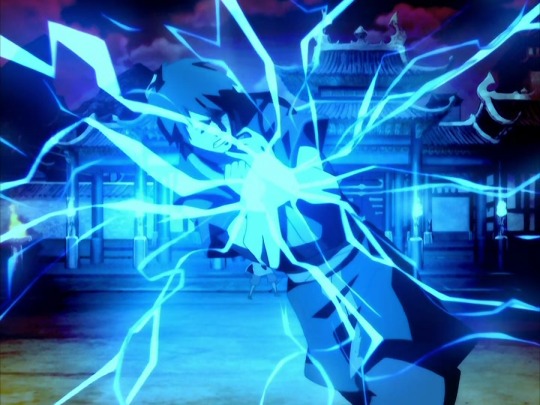
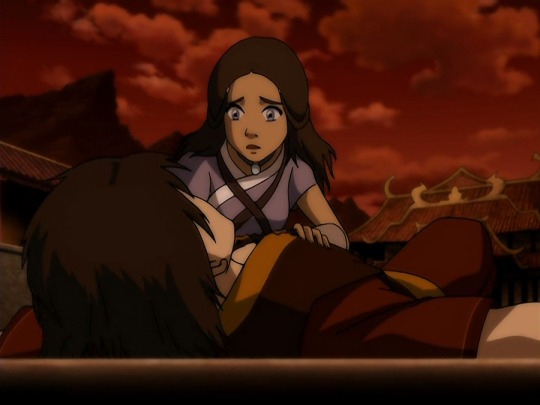
Both of their roles are so critical in this fight. They both save each other. The scene has such raw emotion to it. These characters were together at the conclusion of their respective arcs for a reason.
This is the perfect conclusion to Katara’s arc. She just played a critical role in ending the war that has caused her trauma her whole life. She just demonstrated her mastery of waterbending (another thing she’s dreamed of throughout the series) by defeating the world’s most powerful firebender during Sozin’s Comet. Even though she had help as all characters do, these are victories that belong to her and demonstrate the growth and power of her character. And to top it all off? She was able to save Zuko’s life. She didn’t have to endure the pain of feeling helpless to do anything while someone else died for her; this time, she had an active role, she changed her fate, and she prevailed. Zuko plays an important role in Katara’s story without dominating it. They perfectly represent mutuality. They add to each other’s stories. Their narratives become stronger when they’re together, without one diminishing or sidelining the other.
So, from that standpoint, that’s why I always see the attraction between Zuko and Katara and why I see it lacking between Aang and Katara. Zuko and Katara’s story doesn’t need some cheap little throwaway moments to shine. It’s integral to both characters’ stories. We are shown not told of the way these characters feel about each other. Given everything we know about Katara, her goals, her values, her past loves…absolutely everything points to Zuko being the true subject of her feelings.
Because let’s be honest. The ending I just described is so much more powerful and so much more Katara than seeing her being relegated back to a doe-eyed love interest for Aang to kiss. It hardly even made sense—Katara played no role at all at the culmination of Aang’s arc. She was relegated back to a love interest, rather than the powerful figure we saw fight alongside Zuko.
#zutara#katara#zuko#atla#anti kataang#canon critical#jet#haru#katara deserved better#aang critical#meta#analysis
427 notes
·
View notes
Text
"zukos character arc is best-
"no aangs flirting skills are-"
"You forgot sokkas hair-"
YALL FORGOT KORRA
SHE WENT FROM THIS
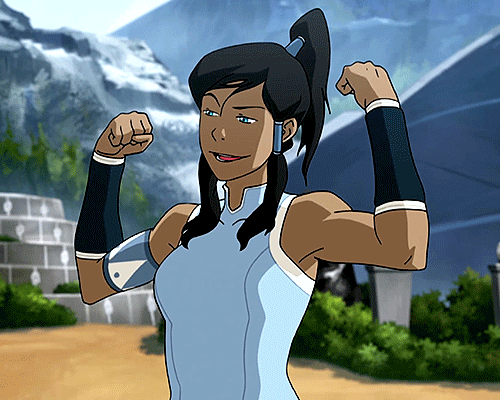
TO THIS

AND STILL GIRLBOSSED HER WYA THROUGH EVERYTHING WHILE ALSO FINDING LOVE AND GAINING BACK THAT MUSCLE!
she also showed a lot of people, like me, that mental health recovery isn't linear. like, girl, that show has problems BUT DAMN IT IF IT ISNT BETTER THAN MoST THINGS YOU SEE
#lok#avatar korra#avatar legend of korra#legend of korra#korra#korra analysis#guys we take advantage of the fact that she comes from an amazing fandom#like she is such a good character#and a great show#and yall trash on it#(im not saying it shouldn’t take criticism)#yall need to chill with the korra hate#you're probably jealous you can pull an asami
436 notes
·
View notes
Text
It’s really funny how much people misremember certain aspects of ATLA and then proclaim to the internet stuff that either never happened or is extremely distorted with absolute certainty. For example, today I saw a person claiming that whole point of Katara’s character arc was unlearning the parentified behaviours she developed in wake of her mother’s death. That a huge part of Katara’s arc was a confrontation of how that trauma fundamentally shaped her maternal tendencies.
The thing is though…WE the audience, can recognize that the parentification Katara experienced was something that was really straining for her, but the TEXT doesn’t. The audience (or at least certain parts of the audience) can identify that her maternal tendencies were indicative of a responsibility that she took on far too young and subjected her to unnecessary pressure and stress. There are flashes of recognition maybe, but for the most part, the show doesn’t actually confront the negative impact that Katara’s maternal role had on her.
Katara never truly unlearns the maternal behaviours that put so much pressure on her because the text doesn’t see it as a bad thing. Arguably, the text doesn’t see much of a problem with the emotional labour Katara takes on and how that labour goes unreciprocated for the most part (particularly from her canon love interest). We see some reflections, but it’s not enough to support a reading of the text where that element is actually extremely obvious and a prominent point in her character arc.
We’re not the ones “watching the show with our eyes closed”, I think you’re just misremembering the canon progression of Katara’s arc to avoid confronting a real issue in the text.
#Katara#pro katara#avatar the last airbender#atla fandom critical#atla discourse#the gaang#character analysis#atla fandom discourse#zutara#atla critical#anti bryke
441 notes
·
View notes
Text
Because I'm having a bad fucking chronic pain day, and feeling some type of way about it, I'm gonna rant more about Ashton.
Can we talk about how Ashton talks about their pain? Or rather, how he doesn't?
I think Ashton's actually mentioned actively being in pain, like... 3 times in the 86 episodes they've filmed so far? The first time that I can remember is during/immediately after Imogen and FCG delved into their mind and actually experienced what it's like to live in their body.
The second time was in the second episode of the Issylra arc, when the group is packing up to move towards Hearthdell, and Ashton mentions off-hand that he was in pain the night before.
And then the third time was e86. When Ashton collapses after dropping his Titan form, and Orym asks if they're okay, Ashton’s response is along the lines of "I'm fine, it just hurts."
You know what Ashton says a lot more often?
I'm so tired. I'm exhausted. We should really take a rest first. Can we please take a fucking rest now?
It seems subtle at first, but as someone who has chronic pain it hits hard. 'Cause most of the time that's exactly what I say.
Because when you're in pain all the time, the healthy/abled/non-chronic-pain-havers around you don't want to hear about it. It makes them uncomfortable.
Being in constant pain and giving voice to it makes you a whiner. A complainer. A wuss. A flake.
Have you tried yoga? Or drinking more water? Or the current fad diet?
So instead, you learn to allude to it in ways that won’t make the ableds uncomfortable. For me, a lot of the time, that takes the form of:
"I'm just really tired."
So, seeing Ashton pushing themself well past their limits to keep up with their friends and doing what the other Hells want - only to end up completely nerfing themself with 2 points of exhaustion... hits very close to home. Especially seeing most of their friends completely disregard their pain until they couldn't anymore.
Orym is really the only one who consistently shows any consideration for their chronic pain - and the boundaries and limitations that go with it. I only had a handful of friends like that when I was younger, and I treasured every single one of them.
As the kid who always got left behind to walk with a chaperone on field trips because I couldn't keep up with the other kids... it brings back a lot of that frustration and hurt to see it playing out like this for Ashton, but also validates it in a way I'm profoundly grateful for.
Anyway. That's all I have to say about that at the moment. I'll climb down off my soapbox now.
(Really slowly though, 'cause my knees are fucking killing me.)
#i continue to have a lot of feelings about Ashton#i'm in a lot of pain right now#and i'm big mad about it#taliesin jaffe is so good at representation#ashton greymoore#cr3#critical role#critical role spoilers#cr3e86#chronic pain#meta#character analysis#long post
410 notes
·
View notes